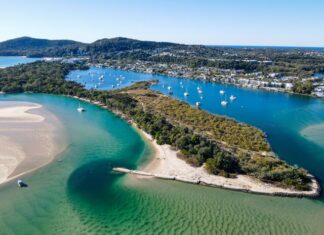‘We’ve only seven men left, sir . . . me, my four brothers and two others”
JIM FAGAN
It is 1919. The bridegroom stands proudly beside his smiling bride. His hands are clasped, perhaps to hide the thumb he lost in the war. His uniform hides his other wounds. With him are his four brothers and behind the bride are her five brothers. The Great War is over, the boys have come home and it’s time to celebrate. What makes this photograph so special is that, statistically, one, probably two, of these brave lads shouldn’t be there.
They all joined up in 1914, landed at Gallipoli, fought in Egypt and on the Western Front in France and Belgium. Of the 416,809 Australians who enlisted more than 60,000 were killed before the war ended in 1918 but these young Diggers survived. The photograph belongs to 88-year-old Allan Niblett, of Tewantin, and, as he says, it was a miracle they all came back. “What odds would you give? It’s like winning Tatts Lotto three times in one week.” The bridegroom is Allan’s father, Richard, and the photograph was taken in Drysdale, Victoria. “My mum, Christina, was Dad’s childhood sweetheart and they were married pretty well straightaway after he came home. Mum’s mother had 11 children and six of her sons were Anzacs, five of them coming home. “The girls gave the boys a prayer book each and they kept them in their tunic pockets. One of them, Tom, sent the prayer book home with a bullet stuck in it. There was a letter saying, ‘Dear Mother, you can see I wasn’t meant to die in this war.’ And he didn’t. The day after peace was declared he was walking across mud on a plank in France. The plank slipped and he fell on a disused bomb which exploded and killed him instantly.” “Dad was a sergeant and in his platoon at Gallipoli there were 24 Diggers which included his four brothers. They were ordered to charge the Turks’ trenches and they were pushed back. They were ordered to charge again and once more they were pushed back. Blokes were falling everywhere. “Their captain said, ‘Muster your men and charge again. This’ll be a surprise. They won’t expect three times.’ Dad said to him, “Well, sir. There’s me, my four brothers and two others left in the platoon. We’ve only seven.” “He was told, ‘Boats just dropped a few off so you can have this bloke.’ The kid looked about 15 and asked Dad, ‘What am I supposed to do, mister?’ He didn’t know enough to call him Sergeant. “Dad replied, ‘When I whistle, we charge. Have a bullet up your spout and when you a see a Turk up shoot him or put a bayonet in him.’ “Dad blew the whistle, bullets flew everywhere and the kid froze so Dad took his hand and led him across to the trench. This Turk got up, shot at Dad, who was lining up his rifle, and took his thumb off and part of his right ear. He never saw the kid again.” “Dad and his four brothers were in from Day 1 to the end. He was wounded twice more, shot in the leg and the thigh in France. He was recommended for bravery three times.” Allan’s Dad was also gassed in the war but in 1939, when he was 47, he was one of the first to volunteer when World War 2 was declared. Said Allan: “He served for two and a half years overseas until it was revealed he had been gassed and he was discharged.” Allan was 18 when he joined up in 1944 to serve in the Second World War. “I was a bomb defuser and some of the work was disarming mustard gas shells which Australia wasn’t supposed to have. They reckoned a lot had been left over from the First War.” When the war ended he was 19 and a sergeant. “I left the army but joined up again later to train the blokes for Korea.” Military service is continued in the family as his grandson, John Chubb, is an engineer in the Australian Army. There is a tragic footnote to this story. In 1953 Allan was in Tasmania nursing his mother who was dying from cancer. He received a call from the police at Queenscliff, Victoria, saying his father had been mugged and killed and his medals stolen. “He was wearing his medals because it was Anzac Day and he had been marching with his mates,” said Allan. “They never caught who did it but years later I got the medals back. My grandson has them now, along with the prayer book with the bullet.” Tomorrow morning, Allan will be at the Cenotaph at Tewantin. He’s had replicas of his Dad’s medals made and he will be wearing them along with his own. He’s not sure if he will march yet but he knows where his thoughts will be. “I’ll think of Dad. He was the most beautiful father.”






